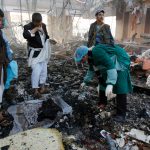In March 2020, Yemen marked the fifth anniversary of its armed conflict and braced for the new threats of COVID-19 to compound the situation facing the “world’s largest humanitarian crisis.” For a country that had previously endured the “triple tragedy” of cholera, famine, and deadly conflict, COVID-19 added to the long list of grave threats to life and security in Yemen. This July, the UN’s Emergency Relief Coordinator painted a bleak picture of the situation in the country, explaining that the humanitarian situation “has never been worse,” that famine is back on the horizon, that conflict is escalating, and that the economy is in tatters. Those conditions are inextricably linked to the way in which the main military forces – Ansar Allah, also known as the Houthis, and the Saudi- and Emirati-led Coalition – have conducted hostilities. Supported by Iran on one side and the likes of the Canada, France, the United Kingdom, and the United States on the other, these powerful military forces have been given the tacit green light by their international backers to continue committing serious human rights abuses, including through the bombardment of markets, schools, mosques, and hospitals without any concern for the consequences.
As a human rights NGO monitoring attacks on health care in Yemen and advocating for a rights-respecting response to COVID-19 globally, Physicians for Human Rights (PHR) has been gravely concerned to see so many parts of the international community give the “all clear” to warring parties that have histories of violently attacking health care. In June, the UN Secretary-General, Antonio Guterres, decided to remove the Saudi- and Emirati-led Coalition from the notorious “list of shame” – a report with an annex listing parties to conflicts that are violating children’s rights, including by attacking health facilities. Further boosting Saudi Arabia’s sense of impunity, the UK in July decided to re-authorize arms sales to Saudi Arabia, claiming to not see any risk of British military equipment being used in a serious violation of international humanitarian law. Through these decisions, the UK and the secretary-general’s office have exhibited a clear disregard for fact-based decision-making and stained their supposed commitments to leadership on universal human rights. To make matters worse, the Trump administration has announced that it seeks to bypass an arms control pact to allow for the sale of armed drones to Middle Eastern arms importers such as Saudi Arabia. These developments come just as the State Department inspector general released a report confirming that the agency has failed to take proper consideration of the risk of civilian casualties when selling $8 billion worth of weaponry to certain Middle Eastern countries last year.
The signals of approval afforded to militaries with atrocious track records conducting hostilities have resulted in an immediate uptick in attacks on civilians in Yemen, including the highest number of air raids by the Saudi- and Emirati-led Coalition since July 2018, according to Yemen Data Project. Just days after the UK secretary of state for international trade announced that the UK government would re-authorize arms sales to Saudi Arabia, a suspected Saudi- and Emirati-led Coalition air strike killed seven children and two women on July 14. On the very same day that the secretary-general removed the Saudi- and Emirati-led Coalition from its “list of shame,” an air strike killed 13 civilians, including three children. All the evidence had indicated that giving the green light to a party with as poor a record as Saudi Arabia would have disastrous consequences.
In March of this year, PHR and the Yemeni organization Mwatana for Human Rights released the most comprehensive analysis of the impact of the conflict on the Yemeni health system, finding that the Saudi- and Emirati-led Coalition, the Yemeni government, and the Houthi armed group have decimated Yemen’s health system, inflicted widespread death, and likely committed war crimes. Critically, the report illustrates patterns of attacks over four years of the conflict and across 20 of Yemen’s 22 governorates, pointing to 120 violent attacks on medical facilities and health workers. Both the Houthis and the Saudi- and Emirati-led Coalition have killed medical workers, with the Coalition primarily responsible for damage and destruction of health facilities through aerial bombardments. To date, there have been no steps taken towards meaningful accountability for these crimes and all too few consequences from the parties’ arms suppliers.
Today, the decimation of Yemen’s health system has created the worst conditions to fight COVID-19. Yemen has seen more than 500 deaths from the virus, though the numbers are likely far higher due to the lack of functioning health facilities and the prevailing fears of visiting them. Of further concern are reports that recent months have seen 50 percent fewer Yemenis seeking treatment for cholera out of fear of contracting coronavirus in health centers. Yemeni and international human rights and humanitarian organizations had made clear to the international community that urgent measures — including a complete ceasefire, the lifting of restrictions on humanitarian aid, and efforts to reduce the prison population — were needed to support Yemen in facing the crisis of COVID-19 and its compound impacts on a country already facing famine, cholera, and conflict.
Yemen is facing tragedy upon tragedy. With such a clear connection between the active destruction of the health system and the perfect storm posed by the compound threats of COVID-19, famine, cholera, and economic collapse, it is urgent that the international community act now to end the abuses. Attacks on health, whether through bombing a hospital or killing a medical worker, can constitute grave violations of international humanitarian law. These attacks cannot be tolerated, let alone given the green light by some of the most influential governments seeking to profit from arms exports to rights-abusing parties. As death rates from COVID-19 continue to spike in fragile and conflict-affected countries, it is unconscionable for lawmakers to continue rubber stamping humanitarian catastrophes abroad. Our leaders must stop this tragedy now.

